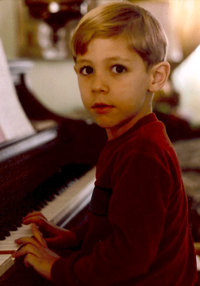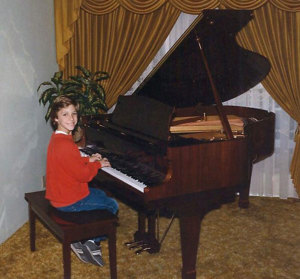Instrumental Piano

If you would have paid an evening visit to the family residence in the early 1980s, you might have discovered this weird introverted kid laying on the living room couch, staring up at the ceiling while listening to an endless variety of LPs on one of those 4-foot record cabinets. You would have been shamelessly greeted by the sounds of Sesame Street, Michael Jackson, Mickey Mouse, ABBA, and the GhostBusters soundtrack. Not at all random.
I apparently spent so many hours listening to music as a toddler that Mom thought it'd be a great idea to start me on an instrument. So she went out and bought a used upright piano (Dad thought she was crazy). On April 21, 1981, at age 3½, I had my first piano lesson. My teacher had never taken anyone so young, but she decided to give it a whirl.

Next thing you know I'm in all these music programs. Unlike other kids being shuttled around to soccer practice and other sports, I was traveling up and down the state playing for musical competitions. After a few years, Mom decided this piano thing was for real and in January 1986 bought me a brand new Kawai baby grand (still owned and played to this day).
A move in Spring 1987 resulted in a new piano teacher where I continued classical studies and annual competitions of Certificate of Merit and National Guild. Piano years paralleled school years, learning a new arsenal of music in September and using those pieces for various programs and competitions until the final recital in June. A bit of summer break was enjoyed before moving up one level and repeating the process. This routine remained steady through junior high, learning 10, 15, or 20-piece repertoires every year. Mom had an ear for music and sat in all my lessons, and also made sure I was practicing at least an hour every day. You can't say she wasn't dedicated!
In 1992, I changed to my third and final piano teacher, a Juilliard graduate, with a strict style of teaching quite different than I was used to! Her strive for perfection resulted in a parade of tongue-lashing every other week, to the point Mom thought she made a mistake. However, it shaped me to be rigid and super-focused, working harder to reduce the number of mistakes made. Lessons eventually became too expensive so she only lasted 18 months, but I definitely came away with something out of it! Thirteen years of classical training came to an end.
However I kept up lessons with another local musician who specialized in music improvisation, learning "style" and not just playing notes fed to you on paper. I spent several years learning how to take a piece or song and kick it up a few notches with different variations. This continued all through high school until I started working in theatre.
It's been over 40 years since the very first lesson. I play frequently for professional gigs, including two weekly church services. I continue to pick up new improvisation techniques and different genres as I go along. It's still relegated to a supplemental income hobby, but if an opportunity ever came up where I could make a decent living with it, I just might have to revisit this area.
Production
During high school/college years (1991-2002), my emphasis was on using MIDI, which is music playing through sound modules controlled by a computer or other sequencing device. This was a fairly new technology at the time, and is also where composing, transcribing and arranging music on the computer came in. My high school offered a Commercial Music class where students created digital music with keyboards, sound modules and computer sequencers. Any music/computer nerd would be daft not to take that elective for 4 straight years. I spent many a lunch hour in the main lab cooking up new compositions or arranging music.
Outside the classroom, I acquired my own Mac computer and sound module to continue working on my projects! Long after graduating, I continued to arrange and compose music, including scores for some of the musicals I was doing. During the late 90s, I had come up with an album's worth of original tracks, all the while re-arranging existing music (especially video game music) for my own personal enjoyment. My best work was composing tracks for an educational computer game in 2003, all fully influenced from the video game world.
Unfortunately the Master Tracks Pro software I used was never updated and became incompatible over time. Personal music production has been in a lengthy hiatus, and my equipment hasn't been updated in ages. They're still classics though, first with the coveted Roland SC-8850 with over 1600 sounds and 63 drum kits. Another device is the Roland MC-909 GrooveBox for dance, trance and techno. Both of these modules complement a Roland RD-600 keyboard. All these are approaching 15-20 years old, but until I find the time to get back into music production, they'll make do until newer models find their way into my studio.
Recreational
In the super early years (1970s/80s), I listened to whatever was around the house or what my parents bought for the LP cabinet. After receiving my first radio, I discovered a Top 40 station (93.1 KKHR Los Angeles) just as 80s pop tunes were entering their peak. I wasn't quite old enough to intelligently connect artists and track names, but still loved the tunes. I'd also borrow Mom's cassettes (or shamelessly claim them as my own if they were good). I consistently kept to the pop genre. The only two groups I listened to from the 70s were ABBA and Bread. Favorites from the 80s would be WHAM!, The Cars, Heart, Mr. Mister, Tears for Fears, U2, Michael Jackson, Sting, Phil Collins, Steve Winwood and Bruce Hornsby.
The 90s became the pinnacle of my listening career. With the first CD player came a Metallica phase, buying all those albums, strange for a kid who had avoided hard rock like the plague, but whatever. MTV was amazing during high school and I quickly got on board with the golden era of music videos. If the "MTV Generation" would have been declared official, I'd definitely be labeled as such! Thanks to MTV, I came to appreciate the alternative genre. This was also when my thrill for dance and techno started to blossom, immediately becoming a top favorite. And who remembers the 12 CDs for 1¢ from Columbia House? Yep, I got sucked into that program picking up tons of music for the collection in 1993. And yes I actually fulfilled the pledge to buy 6 more qualifying purchases, taking advantage of those 2 for 1 deals.
Favorites from the early 1990s would be The Offspring, Green Day, Gin Blossoms, Counting Crows, Stone Temple Pilots, Nirvana, Soundgarden, Bad Religion, Culture Beat, Haddaway, and 2 Unlimited. By the late 1990s I wasn't buying as much, but still religiously watching MTV, discovering new favorites coming in. Alanis Morrisette became the staple of my listening habits. While The Offspring and Green Day continued to pump out decent stuff, new favorites would be Goo Goo Dolls, Oasis, Foo Fighters, Meredith Brooks, and... Spice Girls (shut up, you).
By the time Y2K rolled around, mainstream was turning stale on me. I ditched MTV with all their lame reality shows. Fortunately, electronic music had morphed into this new golden era. I became so enamored with it, I completely changed over to Electronic. Granted a few other pop artists caught my ear, but for the most part I was committed those energetic beats. Several Trance Nation albums for Ministry of Sound were mixed, becoming my new addiction. With the advent of the popular DJ Doboy, many new favorites were discovered with his Vocal Trance mixes. Favorites for the non-electronic genres would be Linkin Park, The Strokes, and Coldplay. As far as the electronic world, it was ruled by Ferry Corsten, Armin Van Buuren, Paul Oakenfold, Robert Miles, Ian Van Dahl, DJ Sammy, Michael Woods, Kenny Hayes, and Above & Beyond, with top billing awarded to Oceanlab.
With the advent of digital music, buying physical media has completely evaporated. But even with digital music stores, I don't purchase much these days. I'll pick up maybe 4-5 new catchy songs a year (or older tracks that somehow evaded me all this time) but that's about it. Most of what I spin is from my youth, with very few new artists in the rotation. These days it seems that Electronic has firmly melded with mainstream, so everything sounds bip-bop and auto-tuned. Some of it is OK, but a lot of it annoyingly bad. But perhaps my tolerance is shrinking with age.
Trance is my #1 pick if stranded on that desert island. I realize it's a niche genre that not everyone digs. And granted there's plenty of electronic garbage out there, such as progressive patterns/beats repeating over and over, which drives me bonkers. I need something with moving bass line, synth waves, and a melody (with optional vocals). "Dreamy" trance is also preferred method as well. What does that mean? Think of flying in an airliner staring out the window during a partly cloudy horizon shortly after sunset. Dreamy! If you're still confused, you could probably just read about it on Wikipedia, but it's best to listen for yourself. If you head over to Digitally Imported and stream their Vocal Trance channel, there are great examples. Spotify also has a Trance channel if you're on there. I'm not a raver or dancer, I just like grooving and bouncing to it. It's all about that bass, the synths, and the optional vocals.
What don't I listen to? Oh, there's a list for sure. Criticize me if you want, but most of this stuff makes me run screaming from the room: Country, Modern R&B, Hip-Hop, Rap, Opera, Classic Rock, and Oldies. Granted, there are exceptions to all of these, but for the most part it's just not my style. I've also noticed that I hardly like any music before my time. If it was produced before 1977 (again, with a few exceptions) it's pretty much off my list. Didn't really mean for it to be that way, but that's how it is.